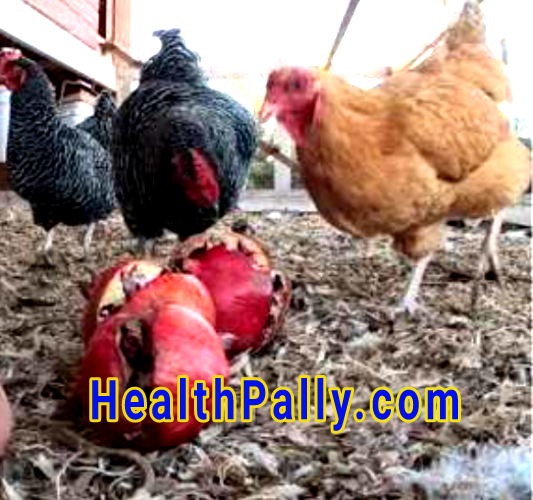How to Feed Pomegranate to Chickens?
Birds eat fruits, and seeds without any issue, but not all seeds are digestible or healthy for chickens.
For pomegranate, you can cut each fruit into 4, and offer them to your chickens to peck at the arils easily.
Offer this once in a while as a supplement, and not in a large amount or as a replacement for their feed for the day.
Can Chickens Eat Pomegranate Seeds?
Are Pomegranate seeds harmful to chickens? Certainly not, they can eat the whole pomegranate.
Small-scale and backyard poultry farmers often throw fruits like pomegranate to their hens as an occasional treat, and they eat both the fruits and arils while they neglect the skin part.
Can Chickens Eat Pomegranate Skin?
Yes, if the rind/skin is chopped and mixed with their food. Pomegranate skin is a bit tough and astringent, so it’s left alone by the chicken.
Pomegranate rind can be dried into powder and mixed with chicken feeds to avail its health benefits.
For example, in broilers, it has antioxidant or heat-stress mitigation benefits when processed into powder, and feed at measured rates.
Is Pomegranate Safe for Chickens?
Yes, the fruits, seeds and rind are safe for chickens.
While your birds seem fine, they may lose appetite and also have soft droppings if they nibble pomegranate arils in large amounts.
Can Chickens Eat All Seeds?
While chickens can eat pomegranate seeds and many other fruit seeds, there are seeds chickens shouldn’t eat.
Some seeds can cause digestive issues, while others can cause loss of appetite.
Can chickens eat Sunflower seeds?
Sunflower seeds can make chickens feel full, and lose their appetite to eat feed.
Can chickens eat Stone fruits?
The seeds and pits of stone fruits such as cherries, apricots, peaches, and plums shouldn’t be eaten by chickens.
These seeds and pits contain cyanogenic compounds – amygdalin or related glycosides.
When chickens crush and chew the seeds, hydrogen cyanide is released in their digestive system.
Can chickens eat Apple seeds?
Chicken can eat a few bites of apple and the seeds with no issue, but in large amounts, cyanide can be liberated and produce rapid signs of cyanide toxicity.
It’s advisable to remove pits when feeding tree fruit to your birds, especially for young birds.
Can chickens eat bitter almonds?
Bitter almonds and any truly bitter varieties of seeds or kernels shouldn’t be fed to poultry birds.
Bitter almonds and some wild kernels contain high amounts of cyanogenic glycosides.
Can chickens eat raw beans?
I’ve substituted corn maize for beans to feed my poultry birds when I was a child, and the result – diarrhoea and stunted growth.
Therefore, uncooked beans, especially raw kidney beans and some other dried legumes are harmful to poultry.
They contain heat-stable lectins – phytohaemagglutinin, which causes severe GI upset and can impair their health if eaten uncooked.
It can also cause dehydration, and general malaise, but once they’re cooked, the lectin becomes deactivated.
Can chickens eat avocados?
While avocado pits, and skin are less harmful to chickens, avocado leaves are poisonous to poultry birds.
The leaves contain persin, a fungicidal compound that can cause myocardial damage in chickens.
Aves are sensitive to persin, and this compound is found in avocado plant parts, including the flesh, skin and seed, therefore, it shouldn’t be eaten.
Can chickens eat tomatoes?
Yes, tomato fruits and seeds don’t pose any threat to chickens, but you should be cautious of tomato foliage.
Symptoms of chickens eating Toxic fruits and plant parts
If your chickens eat a lot of rind, or ingest many crushed pits/seeds from stone fruits – apple cores with lots of seeds, crushed cherry/apricot pits, the following are the common symptoms.
Lethargy, breathing difficulty, a bluish or purplish comb, tremors, inability to pass feed, collapse, or persistent vomiting/retching, diarrhoea and dehydration.
Once these symptoms manifest, contact your poultry vet immediately.

Growing up in a family deeply rooted in agriculture, I developed an early passion for cultivating the land, caring for animals, and exploring sustainable ways to improve farm productivity.
I’ve worked extensively across multiple areas of agriculture, food and cash crop cultivation, poultry farming, fish farming etc.
At FarmPally, I enjoy sharing practical insights drawn from real-life experiences to help farmers, pet owners, and agriculture lovers make informed, and sustainable decisions.

